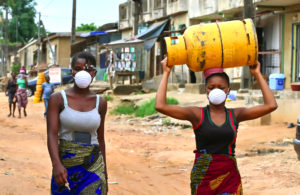Nearly three months after the World Health Organization declared that Covid-19 was no longer a global health emergency, the repercussions of Africa’s policy response to the pandemic are yet to subside. Quite the opposite: as a result of its response to a contagion that had a relatively low impact on African mortality, the continent now faces a decade or more of austerity. To understand what this will mean, look no further than the smallest country on the mainland.
When The Gambia announced its first Covid lockdown in March 2020, the country was already fragile. Following years of President Yahya Jammeh’s dictatorship, the democratic government installed under President Adama Barrow in 2017 had ushered in an era of hope. There was, for instance, a noticeable drop in Gambian youth’s attempts to cross the Sahara and the Mediterranean to reach Europe. Yet the country’s pandemic response has erased those gains, and also dealt a severe blow to Gambians’ confidence in its newfound democracy.
In March 2020, as many African countries entered lockdown, The Gambia’s main market at Serekunda closed for six weeks, in accordance with WHO advice. Yet late March is when Gambians buy seeds to prepare for planting, in readiness for the rains — and the unilateral closure of markets meant that seeds were widely unavailable. A transport shutdown also meant that, in those rare cases when they did have seeds, people could not take them to their villages for planting. Even when public transport restarted, several weeks later, social distancing requirements meant that buses were only allowed to operate at half capacity. As this was uneconomic, many buses did not run at all.
Meanwhile, anyone who did manage to sow crops then had difficulties in harvesting, since social distancing protocols meant that no more than two people could work a plot at one time, where usually the whole family is involved. When food was finally taken to market, the forced impoverishment of the population meant that few could afford to buy it and much went to waste: the UN estimated on-farm losses of 50% in Africa in 2020.
The aggregated effect of The Gambia’s Covid response was a massive reduction in farming revenue and in available food. In effect, these were policies guaranteed to cause hunger and malnutrition — and to stoke food price inflation through the destruction of stores and harvests. Food inflation quickly grew in 2021, long before the war in Ukraine, and although in The Gambia it declined from 18.7% in December to 17.49% at the end of January 2023, food prices remain much higher than pre-pandemic levels.
At the same time, and as in the rest of the world, the Gambian government threw money at Covid-19. Donor advice on hygiene saw all public institutions forced to buy large plastic vats and gallons of hand wash and disinfectant. This, and the costs of implementing Western biomedical surveillance regimes (such as quarantined hotels, case tracking and surveillance), was paid for by taking on new debts: the Gambian government deployed a 500 million Dalasi ($10 million) emergency response fund — a vast sum for a country with a GDP per capita of $772. This was financed by a World Bank loan of the same value, and by an IMF loan of $21.3 million.
Meanwhile, Gambian tax revenues fell by half in 2020, owing to the economic shutdown, meaning that debt repayments stacked up even higher. This is money that The Gambia does not have: the country is beset by poverty and malnutrition, with a median age estimated as under 18 years of age and a teacher’s monthly salary of less than £50. It was frequently said by many in the capital Banjul that “we could have fed the country for 10 years for the amount of money that we spent on Covid-19”.
Gambians themselves protested vociferously. Some tried to break into Serekunda market to continue working, and others — when a mask was demanded — asked who would pay for it. But the question remains: why did Gambian politicians implement these scandalous policies? The truth is that creditor pressure from the EU and other Western embassies, from the World Bank and the WHO, made it almost impossible to do anything else.
Still today, billboards line the roads with EU funding logos, indicating the “correct” way to wear masks. This offers a flashback to the bombardment which Gambian officials received from Western agencies on handling Covid-19. Weekly flurries of information arrived with instructions on “appropriate” behaviour. Weekly “situation reports” were demanded from the Gambian Ministry of Health by these partners: these reports had to indicate the effectiveness of the Covid protocols, and case numbers. This information was a prerequisite for further access to the finance so essential in the economic meltdown.
The Covid vaccine rollout made this dynamic even clearer. When, by late 2021, vaccination numbers remained low, the UK High Commission warned Gambian counterparts that tourists would not return until all those in the tourist industry were vaccinated. Indeed, the UK only removed The Gambia from the red-list of countries once the vaccine rollout had “decreased risk to British nationals”. In the end, public officials were virtually forced into a vaccination programme which many did not want. Most of these vaccines were not gifted to the country, but paid for through World Bank loans which increased structural indebtedness.
The consequences for the Gambian young were particularly severe. The closure of schools in the pandemic made schoolgirls vulnerable to being sent away for marriage by parents desperate to earn some dowry money to assuage the pain of the pandemic restrictions. One analyst described how early marriage had become common in The Gambia during the pandemic, while the Deputy Secretary-General of the Gambian Teachers’ Union claimed that 25% of girls had dropped out of school owing to the closures.
There has also been a huge increase in Gambian youths seeking to migrate to Europe illegally. The restrictions shattered the Gambian economy. Hotels, which employ more than 50,000 Gambians, were closed. The youths lost their jobs and many of them were forced into the dangerous “backway” journey to Europe. Indeed, the fledgling democratic government’s noticeable achievements in youth job creation were all but wiped out by the pandemic, and the 2022-23 season tourism was still only at 30% of pre-pandemic levels.
Another harm came in the primary health sector. The pandemic and the endless Western agency briefings as to the requirements on vaccination, social distancing and masking meant that frail health facilities were completely rewired to focus on Covid-19 patients. This meant that, as malaria, fevers and digestive diseases took their usual toll on the population, patients were largely forgotten. The medical personnel, drugs, ambulances and facilities were all dedicated to fighting the pandemic in accordance with the demands of Western embassies and NGOs. This made maternity, child health and outpatient services suffer disruptions which were, in many cases, fatal. There was also a severe disruption in the Meningitis A, Tetanus, and Hepatitis children immunisation schedules, which still have not completely recovered.
Given the devastating impacts of the pandemic response on the general population, Covid vaccine hesitancy is strong. Whereas vaccine uptake was strong prior to Covid-19, a recent survey suggested that close to 70% of Gambian adults surveyed trusted “prayers” more than the vaccines. Many accuse healthcare officials of diagnosing simple cases of malaria as Covid-19. Popular distrust extended to the Government’s efforts to alleviate the food scarcity caused by the restrictions. A series of corruption scandals point to the embezzlement of Covid-19 relief funds, while key suppliers contracted by the World Food Programme over two years failed to deliver the required 8,550 tons of rice intended as relief for families.
All of this could take decades to fix. Austerity has been forced on the country by external creditors and their incessant demands for information and compliance to protocols that, to most Gambians, were useless — and where Covid-19 was far from the greatest health threat they faced. As elsewhere around the world, vast levels of corruption were involved with the effective printing of money that went with the Covid response. Meanwhile, international solidarity collapsed, as Western activists appeared far more concerned by the political landscape in their own countries than by the effect of these policies on African lives — about which many remain reticent to this day.
What policymakers do not appear to have grasped are the consequences all this will have. For all Bill Gates’s plans, and the current US government’s ideas about future pandemic preparedness and mass vaccine manufacturing in Africa, it seems unlikely that many in The Gambia, at least, will be willing to play ball if anything similar is tried again.
Disclaimer
Some of the posts we share are controversial and we do not necessarily agree with them in the whole extend. Sometimes we agree with the content or part of it but we do not agree with the narration or language. Nevertheless we find them somehow interesting, valuable and/or informative or we share them, because we strongly believe in freedom of speech, free press and journalism. We strongly encourage you to have a critical approach to all the content, do your own research and analysis to build your own opinion.
We would be glad to have your feedback.
Source: UnHerd Read the original article here: https://unherd.com/



